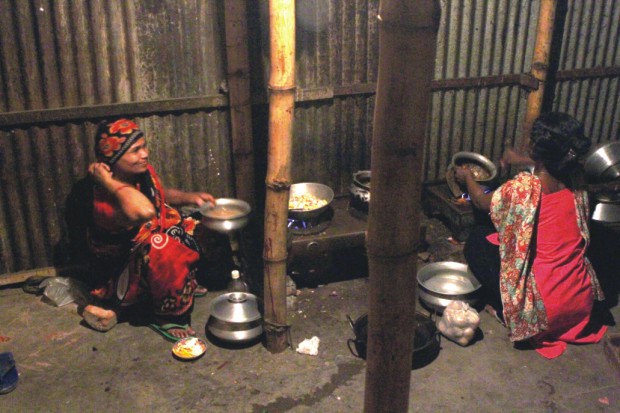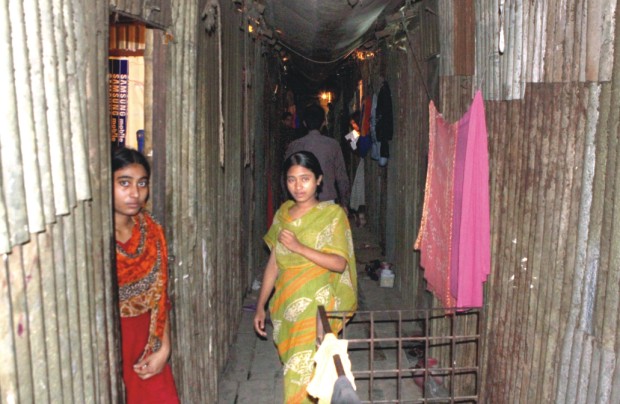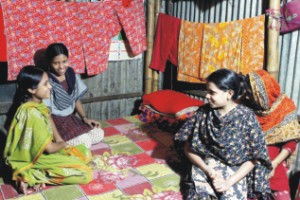| Home - Back Issues - The Team - Contact Us |
 |
| Volume 10 |Issue 17 | April 29, 2011 | |
|
|
Special Feature
Half a Life Following the countrywide demonstration last year, the minimum wage for the Rifat Munim Dilu, a young woman in her early twenties, leaves home for her garment job early morning and remains busy at the factory for the rest of the day. After doing overtime, when she comes back in the evening to her ramshackle, tiny room in the Kalapani area of Mirpur 12, she looks exhausted, barely able to speak. Yet on her arrival as she finds her mother cooking dinner and her younger siblings waiting happily for the meal, a feeling of contentment gets the upper hand, wearing away the unkempt look from her face. Getting to the room which she calls 'home' is not an easy task for a stranger. The untidy place that would otherwise provide the space of a four-room apartment for a well-off family, is home to nearly 15 families, and each with no less than five members occupies an identical room like Dilu's, not bigger than ten feet by eight feet. All rooms, made of bamboo and wood planks, and roofed with corrugated iron sheets, are arranged in two rows separated by a narrow passage with as much space as is necessary for one grown up to move about. The whole place swarms with mosquitoes and groups of half-fed are everywhere. Dilu's room stands at the rear where the two rows end.
“I have to work very hard to make both ends meet. Yet when I see my brother and sister are no longer going without food, I feel that my hard-work has been worth it,” says Dilu with a relieved smile on her face. Her mother does most of the household chores and her father tries his luck at small businesses every now and then. However, he ends up helping her mother wind up the chores such as cooking. But the story had begun about a decade ago in a remote village of Kishoregonj. The father, having lost everything like thousands of poor farmers there, had migrated to Dhaka. In the beginning, he used to run the family by pulling a rickshaw or doing other small businesses. But over the past few years, while Dilu has become the breadwinner of the family, her father has learnt to speak as less as possible. The obvious shift in the gendered division of labour in the family has brought about some visible changes in their behaviour. Dilu has been working in the woven sector for three years. This sector produces denims and accounts for 60 percent of the total garment products being exported every year. Her working hours range from eight in the morning to five in the afternoon. But often, like all her co-workers, she has to do overtime usually till eight in the night, but sometimes till ten or later. Previously she received Tk 2,800 a month when salary for an entry level worker was a meagre Tk 1,600 only. But following the countrywide workers' unrest demanding pay hike, she now gets Tk 3,800. Added to this is the overtime payment which almost doubles the amount she earns monthly. “We have to work harder than other sectors. But thankfully, the garment owner does not deprive us of our overtime payment. Considering my overtime pay I earn nearly Tk 8,000 a month,” shares Dilu. That is definitely good news on the eve of May Day - that workers are given their due overtime pay. Be that as it may, it is time for us to look into how far the increased salary structure has really changed their lives for the better. Take Dilu's case for example. The room she lives in is rented for Tk 1,000. Then there are the spiralling expenses of essentials including rice, oil and even vegetables. “Even though we are now given one thousand taka more, the hardship still persists. That's why we don't feel pressure when we are compelled to do overtime as a precondition of the job,” expresses Dilu.
Things for Fatema Khatun are even worse. She lives in another room of the same house. Although she has got almost a similar story to tell, she earns less than half of Dilu's earning and as such, her room is significantly smaller. Three years ago,when her husband was over head and ears in debt in another village of Kishoregonj, they had to migrate to Dhaka. Her husband is a rickshaw puller who has no fixed income and can hardly run the family on his own. So she had to take a job in a knitwear factory that produces sweaters. She receives Tk 3,200 a month. Sweater factories do not have overtime pressures since demand for sweaters is seasonal. But when demand is high, they earn a lot more. With such a small amount of money her contribution has been pivotal in maintaining the family. “Our salary has not increased even though we work no less. I work twelve hours a day beginning at 8 in the morning,” she complains referring to the fact that they were excluded from the benefit of the pay hike since the countrywide unrest was conducted by the garment factory workers who work under BGMEA, not by the knitwear factory workers who work under BKMEA. In a family of six, she has three children and her mother-in-law to take care of. All six cram into that small, stuffy room. What seemingly saves them from the scorching summer heat is the supply of electricity, even though it keeps coming and going off every one hour. But they have to spend a lot of money over firewood for cooking. “You know how much we get to spend over firewood? Nearly one thousand taka a month. Then there is the price hike which never seems to stop. But I work so hard that I cannot even cook food for my family. And what do I get?” she says in a despondent voice. In spite of the pay hike for the garment workers, hardship persists because of continued inflation in the country. So the hardship of the knitwear workers, who have not seen a pay hike, is easily perceivable. But an inevitable change can be seen in the family sphere, especially in the gendered division of labour. Along with it is visible an empowered position of women in decision-making. Going deeper, however, a different picture comes out altogether. All the women interviewed in the Kalapani area are of the opinion that they work because poverty has forced them to. But when it comes as a choice, they would prefer not to work and rely rather on their husbands for the decision. “I'll work if my husband wants,” opines Dilu. “I work to help my family. Who can go against her husband's will?” echoes Fatema. Apart from these women who live with families, there are the comparatively free women who live in messes and whose lives reveal a totally new dimension of the garment workers' experiences in Dhaka.
Shirina Aktar, a garment worker at a factory in Tejgaon, lives in one of the rooms on the first floor of a two-storey building at Uttar Begunbari. The walls and roof of the building are built with corrugated iron sheets, only the floors are made of wood planks. As you go up the staircase, it rocks a little, unsettling you a bit with the possibility of it crumbling down. Beside the staircase on the ground floor, your eyes will be set on the inundated public toilets and bathrooms encircled by a slightly raised wall. The same space on the first floor is used to set two gas stoves where the nearly 20 families of the floor cook by turns. Then you walk through a narrow passage flanked by small rooms (not bigger than ten feet by ten feet). As you keep walking down the rickety passage ignoring the tremors generated by your steps, Shirina, a woman in her late thirties appears before you and says, “Ahen, bhangbo na.”(Come, it won't break down). Then you enter an identically stuffy room with a single bed occupying two thirds of the room; and listen to the same story of migration and struggle for survival, and finally of a garment job with the same working hours as a way out of all uncertainties. But a fundamental difference remains: they live in a mess, all being either unmarried or divorced. Here too you will find garment workers living in a family. But here you will also find apparently independent women renting a room to live in a mess. Shirina is the leader of one such room with three other roommates and the four share the same bed. By the time you cope with the musty smell coming from all over the building, Shirina starts, “I was divorced about twelve years ago. Since then I was living with my parents and brothers' families in Narsingdi. At one point I started to feel very helpless as well as worthless since my two children and I had become a heavy burden. But then I decided to move to Dhaka and with the help of some acquaintances I got a job in a sweater factory,” continues a cheerful Shirina. “Now I've settled down in my job and I feel much better. Not only do I support myself, but also I support my children and send money to my parents.” She has been working in the city for five years, and now she earns nearly nine thousand a month. Still, she opines that their earning has not increased in keeping with the price hike. “In one sense, the situation has rather deteriorated. Our salary has slightly increased, but prices of essentials have increased more,” she says. Determined not to marry again, she makes her own decisions and she wants to stick to this job. “Although I managed the job because of poverty, now that I'm in this profession, I understand how important it is for a woman to have a job.” Roksana Aktar, who had come along with her sister from Mymensingh, holds the same opinion about the pay hike and their worsening living conditions, but holds a different one about having a job as a woman. “Now I work just to help my parents support the family. But after marriage, I'll do what my husband wants me to. In fact, I don't feel like working outside home,” says Roksana echoing Dilu and Fatema. The other roommates Nilufa and Shafia hold the same opinion about women's employment. Despite significant shifts in the gendered division of labour and substantial changes in women's perceptions about their position and empowerment, traditional ideas about their feminine role still prevail amongst female garment workers. But what all of them have come to realise is that what they get paid is very low compared to the laborious work that they do. Taking advantage of cheap labour provided by mainly rural women coming to the city, the sector has now become the biggest industry of the country, which accounts for approximately 80 percent of the total export earnings amounting to $12 billion last year. Employing around 3.5 million workers, the ready-made garment industry also contributes to foreign exchange earnings and poverty alleviation. A number of other industries offering the raw materials and accessories for this sector are also on the rise. “The impact of this industry on the economy of Bangladesh is huge. In spite of many obstacles, it is growing at a 40 percent rate. But unfortunately, the wage of the workers is still unsatisfactory,” says Mustafizur Rahman, executive director of Centre for Policy and Dialogue (CPD). The most disturbing fact about their low wages is that no quarters, neither the BGMEA nor the government bodies have come forward spontaneously and have announced a justifiable wage that would be consistent with current inflationary trends. “If necessary, the garment owners should train the workers and make them more skilled. But their wages must be increased since they are the ones who keep the economy moving on,” says Rahman.
Copyright (R) thedailystar.net 2011 |



